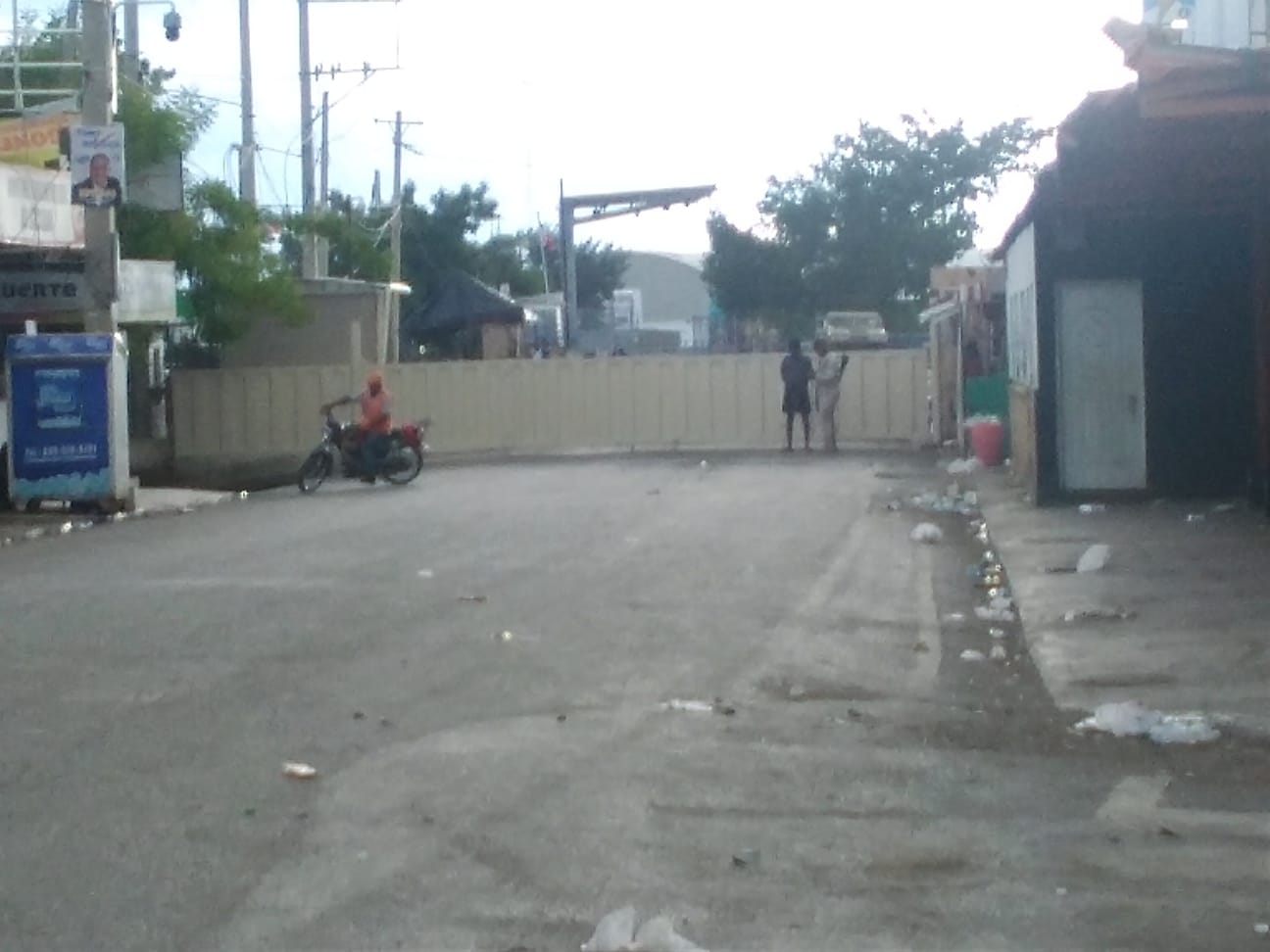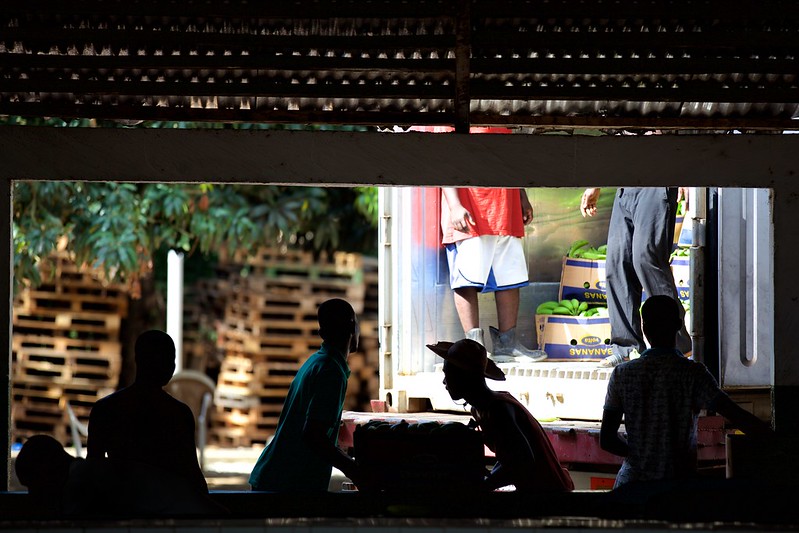Raids on banana plantations ramped up
Banana plantations in the Montecristi region of the Dominican Republic are facing frequent raids by police and immigration authorities. The region is a key banana producing hub and only a 30-minute drive to the border which Dominican Republic shares with Haiti.
“I have never seen so many trucks in the banana zone loaded with Haitians as I did today. They are our brothers and sisters and the lifeblood of the banana industry. It is a terrible situation.” stated Crusito Toribio, President of The United Union of Workers of the Banana Sector and Agricultural Plantations of Montecristi (SIUPTRABAM) – whose membership includes employed workers and small agricultural producers of the banana and other sectors.
According to the General Directorate of Migration, 23,829 migrants were deported from Dominican Republic in the month of August alone, with the collaboration of the national army, navy, air force and police. The vast majority of the undocumented migrants were removed to neighbouring Haiti.

Dominican banana industry reliant on Haitian workers
The Dominican banana industry depends on the Haitian migrant workforce to undertake the manual labour required to grow bananas. In Montecristi, studies show that 80 percent of the workforce in the banana industry is of Haitian origin – with the remaining 20% of Dominican workers employed largely in administrative and managerial positions. The manual work of farm labourers – like those in the construction sector – has long been dominated by migrant workers, with Dominicans disinclined to take up such work – partly due to low pay and hard working conditions, and partly due to its perceived low status.
Workers still undocumented
In light of the immigration raids, a joint statement was released in early September by the Dominican banana workers union SIUPTRABAM, the national trade union confederation CASC, migrant rights NGOs Fundación Étnica Integral (FEI) and the National Roundtable for Migration and Refugees in the DR (MENAMIRD). Acknowledging the efforts made by ADOBANANO and the Dominican authorities, the statement goes on to raise concerns about indiscriminate immigration raids on the banana industry.
‘We share our great concern that solutions be found, and request that indiscriminate deportations should cease, in order to protect workers. The deportations as they are currently being carried out are impacting the Dominican banana industry’, it reads, before raising concerns about the impact of migration raids on the county’s international reputation: ‘Indiscriminate deportations of workers from the banana sector further tarnishes the country’s poor labour reputation in international export markets.’
Following the publication of this joint statement, which included a direct appeal to President Luis Abinader to intervene, a meeting of the national inter-institutional round table on migration was called by Labour Minister Luis Miguel De Camps for 12th September. However, the meeting was later postponed due to a crisis on the border over the disputed construction of a canal on the Haitian side, which has led Dominican authorities to completely close the border with Haiti.
Key actors in the round table on migration include representatives from several government departments, the national banana producers’ association, ADOBANANO, small farmers association leaders and workers union representatives. Fairtrade International is also a key stakeholder in the D.R., where an estimated 70% of export banana production is Fairtrade certified. Previous efforts to regularise migrant workers in the Dominican banana industry – and beyond – have had limited success.
Efforts towards migrant regularisation have been hindered by the deepening crisis in Haiti following the assassination of Haitian president Jovenel Moïse in 2021, and the political turbulence and breakdown of Haitian society that followed. Developments in Haiti have stoked anti-migrant sentiments in some sectors of society, with recent reports of local vigilante groups rounding up migrants and later extorting them for money to be released from fake immigration detention. Meanwhile, genuine immigration authorities are accused of repeatedly deporting vulnerable groups including minors and pregnant women, prompting UN experts to release a statement calling for the Dominican Republic to ‘end the intimidation, detention and deportation of pregnant migrant women seeking medical care’.
Migration must be regulated to protect workers’ rights
Historically, Haitian migrants that were recruited to work on sugar and other agricultural plantations in the Dominican Republic, were housed on in basic accommodation on plantation land, in settlements known as bateyes. Most Haitian migrant workers in the Dominican Republic today still live in very basic conditions, often sharing accommodation with large groups of other workers in order to lower their outgoings and send more money home to their family in remittances. According to a 2021 study by Caribbean think-tank OBMICA, ‘The places of residence are generally very precariously built collective dwellings in conditions of poverty and marginalisation in the villages near the farms where they work’. Basic sanitary conditions, such as shared latrines, are common, along with frequent electricity blackouts. In addition, the population faces significant barriers in the access of basic services and continued discrimination based on nationality and race.
The recent dispute between Dominican authorities and those in Haiti who are behind the construction of the canal near the border at Dajabon further complicates an already tense situation. While the diversion of the waters of the Rio Dajabon (also known as Rio Massacre) is said to convene a treaty signed by both states in 1929, the lack of institutional representation on the part of Haiti makes it impossible to maintain dialogue. The criminal gangs that control a large part of Haiti are hostile not only to the Dominican state, but also the various diplomatic representations with other states who have formal relations with Haiti. The diversion of the river is backed by a group of Haitian agricultural entrepreneurs and there are concerns that, due to its scale, it will dramatically impact producers on the Dominican side of the border and pave the way for future contraventions of bilateral agreements. Unfortunately, the dispute has another secondary effect which is to dramatically increase anti- Haitian prejudice.
Banana Link’s International Coordinator, Alistair Smith, who recently visited the Dominican Republic to support the regularisation efforts, commented: ‘Banana Link is concerned about the reports of indiscriminate deportation of banana workers in the Dominican Republic. Faced with this complex situation, we urge retailers not to simply pull out of the Dominican Republic, but rather to work with producing companies, the Dominican authorities and all other stakeholders in order to find solutions that protect the Dominican banana industry while ensuring that migrant workers enjoy the same labour rights as any other worker. Banana Link fully supports the statement made by SIUPTRABAM and is ready to work in partnership with local actors in any way we can.’
